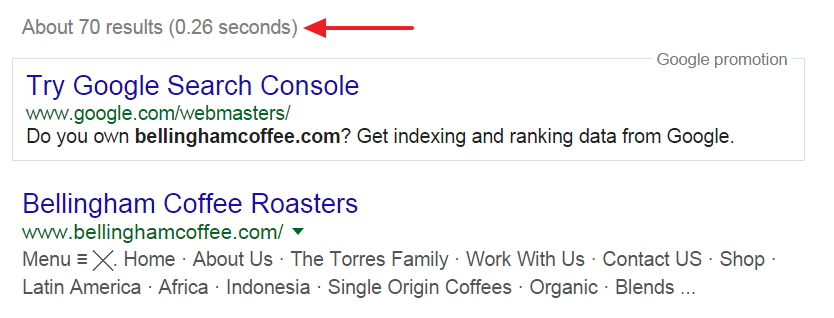By checking what pages Google and other search engines have indexed from your site, you can quickly get a handle on:
- Whether the pages you want people to find are being indexed
- Whether pages you don’t want found are getting indexed
- Whether pages are being indexed twice under different URLs (either under different categories or with and without www)
- Whether you’ve got malware issues
So how do you make the check?
Just enter site:yourdomain.com into either Google or Bing:

 And if all goes well, you should see this:
And if all goes well, you should see this:

Your results will vary, of course, depending on the size of your site. But that total is a quick check for potential problems, as we’ll see shortly.
The notice about Google Search Console is just a promotion, and not a warning that you’ve failed to sign up your site. But it’s a good reminder to get signed up with Search Console (formerly Webmaster Tools) – it’s free and very helpful. Bing also offers a free set of tools for webmasters.
So what should you watch for in the search results?
Well, you don’t want to see this:

It means Google thinks it’s found malware on some of your pages. If you’ve been hacked, you need to fix the problem, and even if you haven’t, you need to get this flag removed from your listings as soon as possible.
Even if your site hasn’t been flagged, you may have suffered a hack that’s flooding the search engines with fake pages from your site, like this:

I’ve seen literally thousands of these pages generated in a matter of minutes – until we found the script, we would watch new pages being generated as we were deleting old ones.
Another sign your site is being flooded with fake pages is that they’re in a language you’re not using on your site:

Now, you may not come across these pages right away, but a quick way to know to look for them is to think about the total number of search results for your site. If you have a 20 page site and you’re getting search results of 980, there’s a problem.
Even if those 980 pages aren’t the result of hackers, they may be the result of your content being indexed multiple times. For example, if you categorize one post under 5 different categories, Google sees them as five different web pages. You’re not going to be penalized for duplicate content, rather you’re splitting your Google ranking between five “pages” – time to read about using canonical URLs.
What about the opposite problem – too few results?

This means Google isn’t seeing your pages and you need to figure out what’s blocking them – if you’re using an SEO plugin for your content management system, you may have set something incorrectly.
Even if the small number of results is accurate – you have a one or two page website – it should be a wake up call that you could benefit from having more pages and therefore be more visible in the search engines!
Is there a way you’re using a site search to learn about your website?
What's Your Take?